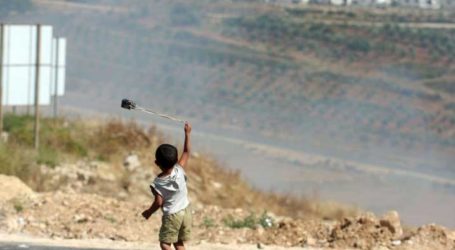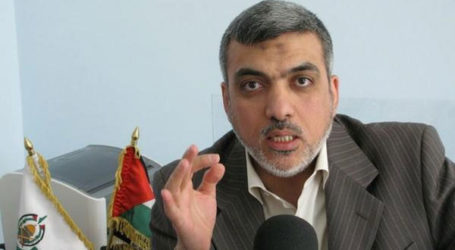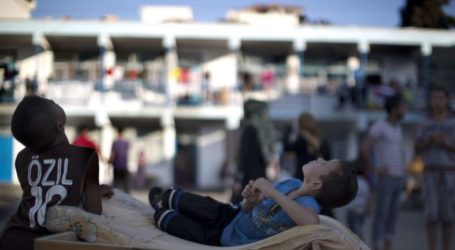ABBAS AND PERES MEET IN JORDAN

The leaders meeting was held on the sidelines of the World Economic Forum on Middle East and North Africa.
Abbas said that peace can only be achieved with the establishment of an independent and sovereign Palestinian state, as International Middle East Media Center (IMEMC) reported monitored by Mi’raj News Agency (MINA).
On his part, Peres urged Abbas to “return to the negotiations table with Tel Aviv”, and told him that conflicts can only be resolved in direct peace talks.
He also said that the Israelis and Palestinians need to reach a final status peace agreement based on the two-state solution, where a “Jewish state lives in peace and security next to the Palestinian state”.
Abbas added that Israel must adopt the Arab Peace initiative that offered full normalization between the Arab states and Tel Aviv in return for establishing an independent Palestinian state with clear and acceptable borders, based on the full Israeli withdrawal from all territories it occupied in 1967, including East Jerusalem.
“We want to grant solid and real hope to the new generations”, Abbas said, “We are seeking comprehensive peace based on the international legitimacy”.
Also Sunday, King Abdullah of Jordan held a meeting with Abbas, in addition to separate meetings with Peres and U.S. Secretary of State, John Kerry.
The Palestinian Authority in the West Bank, and the Palestinian Liberation Organization (PLO), had to quit direct peace talks with Tel Aviv due to its ongoing invasions and violations, including home demolitions, and the ongoing and escalating settlement construction and expansion activities in the West Bank, including in occupied East Jerusalem.
Tel Aviv also refuses to recognize the internationally guaranteed Right of Return of the Palestinian refugees, and refuses to hold talks on other core issues such as Jerusalem, borders and natural resources.
The Israeli–Palestinian conflict is the ongoing struggle between Israelis and Palestinians that began in the early 20th century. The conflict is wide-ranging, and the term is also used in reference to the earlier phases of the same conflict, between the Zionist yishuv and the Arab population living in Palestine under Ottoman and then British rule. It forms part of the wider Arab–Israeli conflict. The remaining key issues are: mutual recognition, borders, security, water rights, control of Jerusalem, Israeli settlements, Palestinian freedom of movement and finding a resolution to the refugee question.
The violence resulting from the conflict has prompted international actions, as well as other security and human rights concerns, both within and between both sides, and internationally. In addition, the violence has curbed expansion of tourism in the region, which is full of historic and religious sites that are of interest to many people around the world.
Many attempts have been made to broker a two-state solution, involving the creation of an independent Palestinian state alongside an independent Jewish state or next to the State of Israel (after Israel’s establishment in 1948). In 2007 a majority of both Israelis and Palestinians, according to a number of polls, preferred the two-state solution over any other solution as a means of resolving the conflict. Moreover, a considerable majority of the Jewish public sees the Palestinians’ demand for an independent state as just, and thinks Israel can agree to the establishment of such a state.
A majority of Palestinians and Israelis view the West Bank and Gaza Strip as an acceptable location of the hypothetical Palestinian state in a two-state solution. However, there are significant areas of disagreement over the shape of any final agreement and also regarding the level of credibility each side sees in the other in upholding basic commitments.
Within Israeli and Palestinian society, the conflict generates a wide variety of views and opinions. This highlights the deep divisions which exist not only between Israelis and Palestinians, but also within each society. A hallmark of the conflict has been the level of violence witnessed for virtually its entire duration.
Fighting has been conducted by regular armies, paramilitary groups, terror cells and individuals. Casualties have not been restricted to the military, with a large number of fatalities in civilian population on both sides. There are prominent international actors involved in the conflict.
The two parties engaged in direct negotiation are the Israeli government, currently led by Benjamin Netanyahu, and the Palestine Liberation Organization (PLO), currently headed by Mahmoud Abbas. The official negotiations are mediated by an international contingent known as the Quartet on the Middle East (the Quartet) represented by a special envoy that consists of the United States, Russia, the European Union, and the United Nations.
The Arab League is another important actor, which has proposed an alternative peace plan. Egypt, a founding member of the Arab League, has historically been a key participant. (T/P03/P04)
Mi’raj News Agency (MINA)






